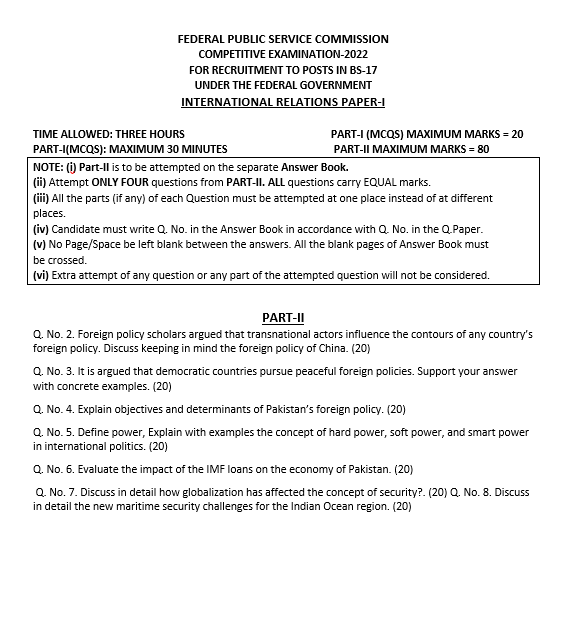CSS International Relations 2022 paper(a)
No. 2. Foreign policy scholars argue that transnational actors influence the contours of any country’s foreign policy. Discuss keeping in mind the foreign policy of China. (20)
No. 3. It is argued that democratic countries pursue peaceful foreign policies. Support your answer with concrete examples. (20)
No. 4. Explain the objectives and determinants of Pakistan’s foreign policy. (20)
No. 5. Define power, Explain with examples the concepts of hard power, soft power, and smart power in international politics. (20)
No. 6. Evaluate the impact of the IMF loans on the economy of Pakistan. (20)
No. 7. Discuss in detail how globalization has affected the concept of security. (20)
Q. No. 8. Discuss in detail the new maritime security challenges for the Indian Ocean region. (20)
Summary of Questions:
No. 2. Foreign policy scholars argue that transnational actors influence the contours of any country’s foreign policy. Discuss keeping in mind the foreign policy of China.
Transnational actors, such as multinational corporations, international organizations, and non-state entities, shape China’s foreign policy by influencing trade, diplomacy, and global partnerships. For instance, China’s engagement with global institutions like the UN and WTO reflects its strategic interest in shaping global norms. Similarly, initiatives like BRI are influenced by China’s economic actors and their need for new markets.
No. 3. It is argued that democratic countries pursue peaceful foreign policies. Support your answer with concrete examples.
Democratic countries often favor peaceful foreign policies to uphold international norms and public accountability. For example, the European Union prioritizes diplomacy and economic cooperation to maintain peace in the region. Similarly, post-WWII Germany has pursued non-aggressive policies, while democratic South Africa emphasizes reconciliation and regional stability.
No. 4. Explain the objectives and determinants of Pakistan’s foreign policy.
Pakistan’s foreign policy aims to safeguard national sovereignty, maintain regional stability, secure economic growth, and protect Islamic values. Key determinants include geographic location, relations with neighboring India and Afghanistan, strategic partnerships with China and the US, economic needs, and global issues like terrorism and climate change.
No. 5. Define power. Explain with examples the concepts of hard power, soft power, and smart power in international politics.
Power is the ability to influence others to achieve desired outcomes. Hard power involves coercion through military or economic means like the US imposing sanctions on Iran. Soft power relies on cultural appeal and diplomacy, exemplified by Japan’s global image as a technology leader. Smart power combines both, as seen in the EU’s use of aid (soft power) alongside economic leverage (hard power).
No. 6. Evaluate the impact of the IMF loans on the economy of Pakistan.
IMF loans provide temporary financial relief but often come with stringent conditions like tax reforms and subsidy cuts. In Pakistan, while these loans address fiscal deficits, they have led to inflation, reduced public spending, and increased debt dependency, often hindering long-term economic stability.
No. 7. Discuss in detail how globalization has affected the concept of security.
Globalization has expanded the concept of security beyond military threats to include economic, cyber, environmental, and human security. For instance, cyber-attacks, cross-border terrorism, pandemics, and climate change are now major concerns. While globalization promotes cooperation, it also creates vulnerabilities through interdependence and the spread of transnational challenges.
No. 8. Discuss in detail the new maritime security challenges for the Indian Ocean region.
The Indian Ocean faces challenges like piracy, territorial disputes, illegal fishing, and environmental threats. The militarization of the region by global powers and competition over trade routes further complicate security. For Pakistan, securing maritime trade and addressing threats like piracy and resource exploitation are critical for regional stability.
